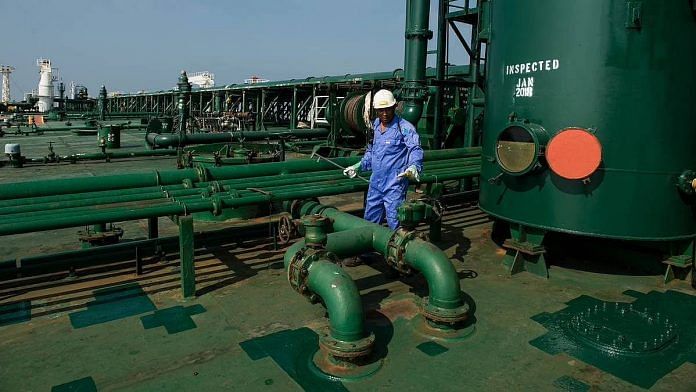New Delhi: For the first hundred days after Russia invaded Ukraine on 24 February, China, Netherlands, Germany and Italy continued to be the biggest importers of fossil fuels from Russia, thereby acting as the primary financiers for Putin’s war, new findings by a think tank has revealed.
While Russia has become India’s “second-biggest” oil source since the start of the war in Ukraine, following its $25 per barrel discount to India and supply chain disruptions since the war, data collected by the Finnish think tank, the Centre for Research on Energy and Clean Air (CREA), also shows that India has been Russia’s eighth largest importer of fossil fuels, at 3.4 billion euros worth of imports since the beginning of the war.
Meanwhile, China and Germany rank as Russia’s primary importers of fossil fuels, at 12.6 billion and 12.1 billion euros, respectively, according to the CREA data. Italy and Netherlands come next, with 7.8 billion euros worth of imports each, with Turkey not too far behind at 6.7 billion. As a whole, 61 per cent of Russia’s fossil fuel exports between 24 February and 3 June went to the European Union, the CREA report added.
The findings are significant, because Russia has heavily relied on international customers of its natural resources to finance the continuation of its offensive in Ukraine. As reported by Newsweek in May, Russia has been spending an estimated a little over 350 million euros per day on the war, while its total fossil fuel export revenue over the hundred days amounts to 93 billion euros.
While China’s large imports appear consistent with the President Xi Jinping government’s expressed positions on Sino-Russian relations and the Ukraine war, the 61 per cent import figure is especially damning for the European Union, since it has been attempting to completely wean off from its historical reliance on Russian resources since the beginning of the war in Ukraine.
Also read: Russia-Ukraine war pushes Germany to shed fiscal prudence, country doubles defence budget
Europe’s fuel dependence on Russia
While the Union has agreed to ban 90 per cent of Russian oil imports by the end of 2022, German news website Der Spiegel has revealed how the European Commission (the executive arm of the EU) is well short of its announced targets so far, with European Parliament member Jens Geier predicting that the EU will, best case scenario, only reduce fuel imports from Russia by half by the end of the year.
Not only are essential storage facilities in Germany and Italy continuing to rely on Russia’s natural gas company Gazprom to maintain supplies, but according to CREA data, European tankers — especially those from Greece — remain the majority transporters of Russian oil to its more distant international markets.
“Strong sanctions against tankers transporting Russian crude would significantly limit the scope for this kind of rerouting of Russia’s exports. In April-May, 68 per cent of deliveries of Russian crude oil were made with ships owned by EU, UK and Norwegian companies, with Greek tankers alone carrying 43 per cent. For deliveries to India and the Middle East, the share was even higher at 80 per cent. 97 per cent of the tankers were insured in just three countries, UK, Norway and Sweden,” CREA added.
India, however, did still emerge as a significant importer of Russian fossil fuels, making up 18 per cent of Russia’s exports, with the Jamnagar refinery being the primary beneficiary, as well as the biggest source of re-exporting.
“More than half of the refined oil deliveries from Jamnagar go outside of India. Approximately 20 per cent of exported cargoes left for the Suez canal, indicating that they were heading to Europe or the U.S. We identified shipments to the United States, France, Italy and the UK,” claimed CREA.
India’s role further exposes the long road the EU has to take for energy independence, or at least, alternatives to Russian fossil fuels.
“For Europe’s political independence, gas in storage in the countries most dependent on Russian gas is much more important than gas in countries that can be supplied sufficiently from the West during winter. European coordination is therefore needed to ensure that the anyway asymmetric hardship is not exacerbated by rich western countries securing all the gas and leaving the most dependent countries more vulnerable,” a report by the Belgian think tank, Bruegel, has observed.
(Edited by Poulomi Banerjee)
Also read: Buying Russian oil is ruble wise but rupee foolish. It bloodies India’s hands



